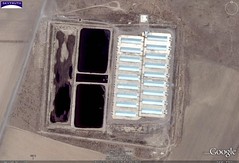 A phactory pharm -- funny, it doesn't look like the image on the packages. They NEVER show the gigantic manure lagoons. Image by SkyTruth via Flickr
A phactory pharm -- funny, it doesn't look like the image on the packages. They NEVER show the gigantic manure lagoons. Image by SkyTruth via Flickr
A sample:
It is in the 1970s that Smithfield Foods revolutionizes hog production. "What we did in the pork industry is what Perdue and Tyson did in the poultry business," Joseph W. Luter III, chairman and chief executive of Smithfield, told the New York Times in 2000.
According to a Rolling Stone exposé, Smithfield "controls every stage of production, from the moment a hog is born until the day it passes through the slaughterhouse. [It] imposed a new kind of contract on farmers: The company would own the living hogs; the contractors would raise the pigs and be responsible for managing the hog shit and disposing of dead hogs. The system made it impossible for small hog farmers to survive -- those who could not handle thousands and thousands of pigs were driven out of business."
In the 1950s, there were 2.1 million hog farmers, with an average of 31 hogs each. As of 2007, there were 79,000 hog farmers left, averaging over 1,000 hogs each. A single Smithfield subsidiary in Utah holds a half-million hogs and produces more shit every day than all the residents of Manhattan.
Rolling Stone's stunning report describes the lakes of shit that surround pig factories as the color of Pepto Bismol because of the "interactions between the bacteria and blood and afterbirths and stillborn piglets and urine and excrement and chemicals and drugs."
Vegetarians who think they are unaffected by this toxic fecal frappe should think again: The sludge is often used to "fertilize" crops that end up on your table.
Beef, poultry and hog CAFOs could not exist without large-scale environmental devastation. Governments at every level exempt these operations from the laws and regulations covering air pollution, water pollution and solid-waste disposal. They are also largely free from proper bio-surveillance, that is, public monitoring to detect, observe and report on the outbreak of diseases.
Mike Davis, author of The Monster at Our Door, writes that scrutiny of the interface between human and animal diseases is "primitive, often nonexistent" because Smithfield, IBP and Tyson would have to spend money on surveillance and upgrade conditions at their hellish animal factories.
Read it all here. Then start growing some food, even just a single tomato or zucchini --
and help get hens legalized here in Salem.
 We shouldn't have to depend on the luck of having a kid with a cellphone around to catch police misconduct (or to document that there was no misconduct); it's time for all law enforcement to be monitored with "cop cams" that capture all their interactions with citizens. Image via Wikipedia
We shouldn't have to depend on the luck of having a kid with a cellphone around to catch police misconduct (or to document that there was no misconduct); it's time for all law enforcement to be monitored with "cop cams" that capture all their interactions with citizens. Image via Wikipedia
![Reblog this post [with Zemanta]](http://img.zemanta.com/reblog_e.png?x-id=65c9a613-edef-47cf-911e-2c8adeb909bb)

![Reblog this post [with Zemanta]](http://img.zemanta.com/reblog_e.png?x-id=327e24f3-da85-42c5-b9e9-cfc4feedc333)



